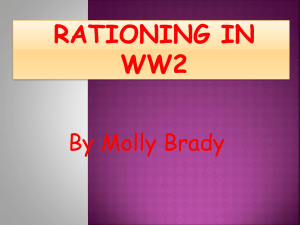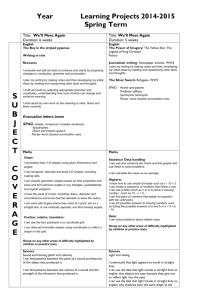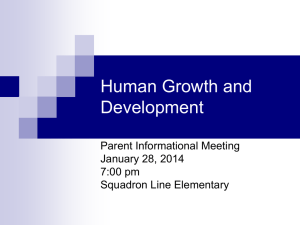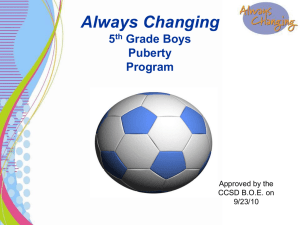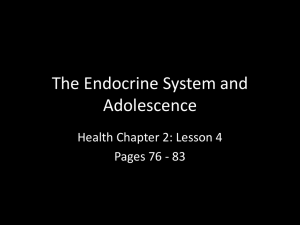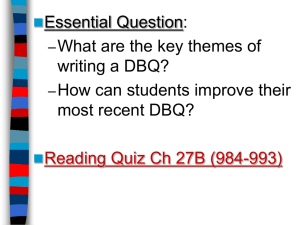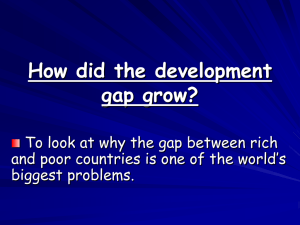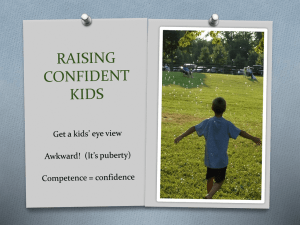here - Wickersley Northfield Primary School
advertisement
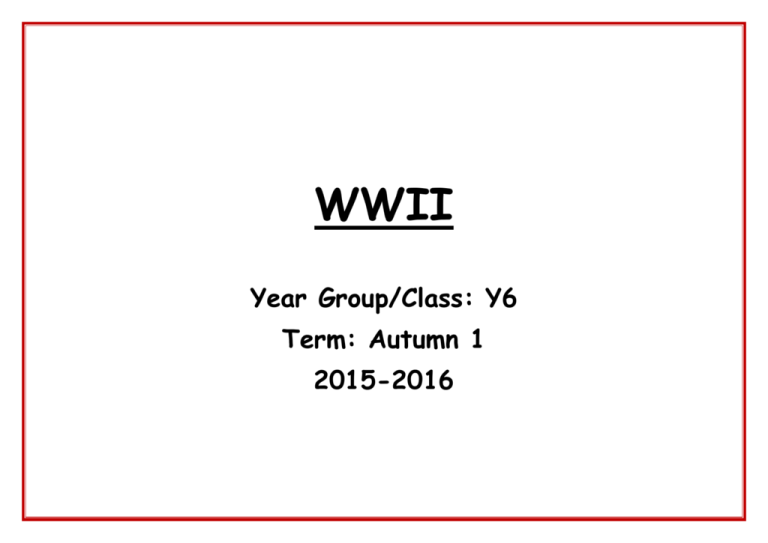
WWII Year Group/Class: Y6 Term: Autumn 1 2015-2016 Developing an ‘EPIC’ Approach to the Wickersley Northfield Primary Curriculum to inspire and equip learners for the 21st Century Medium Term Project Overview for Year Group: 6 Teacher: Mrs Steel and Mrs Myatt Term: Autumn 1 Year: 2015/16 Project Title & Enquiry Question: What was life like during WW2 for families of Britain? Lead Subject: History Visit/Visitor/Theme Day: Eden Camp Weeks: 8 Science Art & Design Design & Technology History Geography Computing PSHE Physical Education Focus: Focus: Focus: Focus: Focus: Focus: Focus: Focus: Rationing food. Effects on prisoners of war. Investigations linked to exercise and heart rate. Crucial crew – drug use. WWII images Dig for victory – grow own vegetables and make soup. A study of significant events during WW2 Locate the world’s countries using maps to focus on Europe concentrating on their environmental regions, key physical and human characteristics, countries and major cities. Evacuee films The ups and downs of puberty Competitive Games Objectives: To use running, jumping, throwing and catching in isolation and in combination play competitive games, modified where appropriate [for example, badminton, basketball, cricket, football, hockey, netball, rounders and tennis] To apply basic principles suitable for attacking and defending develop flexibility, strength, technique, control and balance. [for example, through athletics and gymnastics] To perform dances using a range of movement patterns take part in outdoor and adventurous activity challenges both individually and within a team To compare their performances with previous ones and demonstrate improvement to achieve Objectives: Identify and name the main parts of the human circulatory system and describe the functions of the heart, blood vessels and blood. Recognise the impact of diet, exercise, drugs and lifestyle on the way their bodies function. Describe the ways in which nutrients and water are transported within animals including humans. Understand the changes in our bodies during puberty. Objectives: To develop techniques including their control and use of materials with creativity, experimentation and an increasing awareness of different kinds of art, craft and design. To create sketchbooks to record their observations and use them to review and revisit ideas. Textile poppies Ink poppies using water pencils Soldier pictures using pastels. Propaganda posters. (Mrs Taylor to add detailed planning) Objectives: Cooking and nutrition: To use and apply the principles of a varied and healthy diet to prepare dishes and understand where food comes from. To prepare and cook a variety of predominantly savoury dishes using a range of cooking techniques. To understand seasonality and know where and how a variety of ingredients are grown, reared, caught and processed. Objectives: A study of an aspect or theme in British history that extends pupils’ chronological knowledge beyond 1066. Timeline A local history study – Sheffield in the Blitz. 1st hand accounts/evidence using videos and other research. Battle of Britain and the significance of it. Importance of remembrance Sunday. Study of Churchill and Hitler for significant people. Objectives: Name and locate countries and cities of the UK, geographical regions and their identifying human and physical characteristics, key topographical features (including hills, mountains, coasts and rivers) and land use patterns; and understand how some of these have changed over time. Human geography including types of settlement and land use, economic activity including trade links and the distribution of natural resources including energy, food, minerals and water. Geographical skills and fieldwork; use maps, atlases, globes and digital/computer Objectives: To design, write and debug programs that accomplish specific goals, including controlling or simulating physical systems; solve problems by decomposing them into smaller parts To use sequence, selection, and repetition in programs; work with variables and various forms of input and output To use logical reasoning to explain how some simple algorithms work and to detect and correct errors in algorithms and programs To use search technologies effectively, appreciate how results are selected and ranked, and be discerning in evaluating digital content To select, use and combine a variety of software (including internet services) on a range of digital devices to design and create a range of programs, systems and content that accomplish given goals, * To understand what puberty and adolescence means. * To understand the correct names for the relevant parts of the body/changes during puberty. * To understand the physical, emotional and social changes that occur at puberty. * To understand that some changes only happen to girls/boys/both. Theme: Growing up – relationships. * To examine people we are close to and how this network changes. * To understand what makes a good friend. * To discuss what we mean by ‘going out’ with someone and what we mean by ‘love’ * To share possible concerns and worries about relationships and suggestions about how to deal with them. To recognise their own work and that of others Objectives: mapping to locate countries and describe features studied. Use 6 figure references, symbols and key including the use of OS maps to build their knowledge of UK and wider world. Mapwork for countries involved in the war – allies and enemies. Study of how the war spread. Rationing/exports/impo rts. Mission pied piper. Week EPIC Focus (lead subject) Weekly Enquiry Question (lead subject) Literacy Science 1 2 3 4 including collecting, analysing, evaluating and presenting data and information To use technology safely, respectfully and responsibly; recognise acceptable/unacceptable behaviour; identify a range of ways to report concerns about content and contact. and to be aware of negative behaviours such as stereotyping and aggression. their personal best. Example of outcomes for team games – See and use PE LTP (LN) See scheme Competition Events: Football Objective: Ball control and moving with a ball E-safety opportunities: Crucial crew – social media 5 6 7 8 Geography History History History History Science DT Art How and where did WW2 start? Which countries were involved? Who were the leaders? Where was the battle of Britain fought? What was the Blitz and how long did it last? What was operation pied piper? What was rationing? Why did we need to dig for victory? How do we remember those that died during the war? Description (Blitz) Poetry (Gas mask) Recount (General) Recount (Eden Camp) Diary (General) Diary (Evacuee) Narrative (WW2 story) Objective 1. Understand that blood is an important transport system in my body. 2. Understand that my blood passes through the heart twice during each circulation (double Objective 1. Explain that the blood collects oxygen from the lungs and in exchange gets rid of carbon dioxide (respiration). 2. Describe the structure of the lungs. 3. Explain what Objective 1. Describe the functions of the different components of blood, e.g. carrying oxygen, fighting infection & clotting. 2. Explain that there are three types of blood vessels: arteries, Objective 1. Measure my own pulse rate. 2. Work out the average (mean) pulse rate. 3. Describe the effect of exercise on pulse rate. Objective As last week Narrative (Flashback – piano) Objective 1. Understand why exercise is important for my health. 2. Explain what I need to keep my body healthy. Objective 1. Explain that the heart acts like a pump. 2. Understand that the blood is pumped to all parts of the body. Objective 1. Explain how alcohol, tobacco and other drugs affect the body. 2. Give some simple first aid. circulation). 3. Understand that it wasn’t until the 17th century that the double circulation was described. Activity Lesson B from Hamilton Trust; Drama and role play of circulation system. Cloze procedure. happens when we breathe in and out. veins and capillaries. 3. Understand that there are different blood groups. Activity Lesson C from Hamilton Trust; Practical activities to understand how we breathe. Measure lung capacity. Activity Lesson D from Hamilton Trust; Use interactive websites to study blood pressure and blood types. Draw diagrams to explain bloodflow. Activity Lesson E from Hamilton Trust; Plan and carry out an investigation to measure effect of exercise on pulse. Activity As last week Results and conclusion Activity Lesson F from Hamilton Trust; Produce a leaflet about Healthy Lifestyles Objective Objective Objective Objective Objective Objective Objective Activity Lesson G from Hamilton Trust; Use interactive website and role play to produce a staying healthy (no tobacco, alcohol etc.) Objective Activity Activity Activity Activity Activity Activity Activity Activity Objective * A study of an aspect or theme in British history that extends pupils’ chronological knowledge beyond 1066. Objective To learn about the leaders and key events/dates of the war. Objective To understand the events surrounding the Battle of Britain and how this led on to the start of the Blitz. Objective To learn about the causes of evacuation To learn about the feelings and experiences of evacuees from a wide range of sources. Objective To understand why rationing was necessary. To understand the impact of rationing on the life of people living in England. Objective To understand measures taken by the government to keep the British public safe. Objective To understand the importance of remembrance Sunday and explain what events happen and when. Activity Study of Churchill and Hitler for significant people. Rise to power of Hitler and role of Neville Activity Battle of Britain and the significance of it. Objective To understand the characteristic features of the Blitz and what types of areas were most likely to be affected. To locate where bombing raids took place. To learn about the effects of air raids. Activity A local history study – Sheffield in the Blitz. 1st hand accounts/evidence using videos and other research. Activity Link to Literacy Pack a suitcase What was needed? What was the process? Link to GR and Activity Look at ration books Which foods were rationed? Look at similarities and differences between foods available then and now. Activity Dig for Victory – dig up vegetables grown by the children and make a soup. Propaganda Activity Importance of remembrance Sunday. Learn about significance of poppies and remembrance Activity Lesson A from Hamilton Trust; Drawing and labelling heart. Listening to heart. Art & Design Mrs Taylor History To learn where and when WW2 took place. Activity Timeline Start of WW1 and study of how WW2 began. Chamberlain. Geography Computing Objective *Locate the world’s countries using maps to focus on Europe concentrating on their environmental regions, key physical and human characteristics, countries and major cities. *Learn geographical skills and fieldwork; use maps, atlases, globes and digital/computer mapping to locate countries and describe features studied. Objective *Place knowledge – Understand geographical similarities and differences through the study of human and physical geography of a region of the UK and European country. Objective Objective *Use 6 figure references, symbols and keys including the use of OS maps to build their knowledge of UK and wider world. Activity Mapwork for countries involved in the war – allies and enemies. Study of how the war spread. Activity Economic state of Germany following WW1 and its rise to power Activity Objective Use technology safely, respectfully and responsibly; recognise acceptable/unacceptable behaviour; identify a range of ways to report concerns about content and contact. Objective Objective Activity Study of Sheffield during the Blitz and other large cities that were targeted. Locate on a map of the UK. Objective ‘Goodnight Mr Tom’ DVD and book. Objective *Use 6 figure references, symbols and keys including the use of OS maps to build their knowledge of UK and wider world. posters. Objective *Learn about human geography including types of settlement and land use, economic activity including trade links and the distribution of natural resources including energy, food, minerals and water. Objective Sunday. Ink poppies and poppy badges Objective Activity Mission pied piper. Where children were moved from and to. Activity Rationing/exports/imports Activity Activity Objective Understand computer networks including the internet; how they can provide multiple services, such as the world wide web; and the opportunities Objective Use search technologies effectively, appreciate how results are selected and ranked, and be discerning in evaluating digital content Objective Select, use and combine a variety of software (including internet services) on a range of digital devices to design and create a range of programs, Objective they offer for communication and collaboration Physical Education systems and content that accomplish given goals, including collecting, analysing, evaluating and presenting data and information Activity Social media activities at Crucial Crew Activity Activity Activity Activity Find information for evacuee films Activity Create evacuee films Activity Continue evacuee films Activity Objective Ball control and moving with a ball Objective To perform dribbling skills with accuracy, confidence and control Objective To perform dribbling skills with accuracy, confidence and control Objective To perform passing skills with accuracy, confidence and control Objective To perform passing skills with accuracy, confidence and control Objective To develop a broader range of techniques for attacking and defending. Objective To develop a broader range of techniques for attacking and defending. Activity Football with class teachers and Hockey with RG. Activity Control games – following a system of colours to pass/dribble/stop /change direction /speed up. Activity Control games – The ghosts (in bibs) act as defenders, aiming to tackle players, take possession of their ball and send it out of the area. Players who have been successfully tackled should then sit out and observe those Activity In a small square area, players work in fours with one player acting as a defender (wearing a bib). The aim of the game is for the players to complete 5 successful passes. Activity From “Piggies in the Middle”, double up the playing areas into rectangles and play “Through the Gates” approx. 4 v 4 players. Introduce two gates into the playing area (the children can choose where). The aim of the Activity Children work in pairs. All attackers in one line, all defenders on the other. On a signal, the attackers attempt to get passed the defenders (to a new line) whilst the defender attempts to stop their attacker from getting passed. (NO PHYSICAL CONTACT). Activity Waves (Group Activity, numbers variable) Players in possession move forward in the playing area dribbling, running with the ball and passing as appropriate. Their aim is to keep possession Objective To apply skills learnt (dribbling, passing, attacking and defending) to game situations. Activity Children can apply skills to game situations Recap their previous football knowledge. players still in possession. PSHE game for the team in possession of the ball is to pass and receive through the gates to receive a point. The other team must mark players and/or defend the gates and try to gain possession. Objective Objective Objective Objective Objective * To understand what * To understand the correct names for the relevant parts of the body/changes during puberty. . * To understand that some changes only happen to girls/boys/both * To examine people we are close to and how this network changes. * To understand what makes a good friend. * To discuss what we mean by ‘going out’ with someone and what we mean by ‘love’ * To recognise their own work and that of others and to be aware of negative behaviours such as stereotyping and aggression. * To share possible concerns and worries about relationships and suggestions about how to deal with them. Activity Activity Activity Activity Activity Puberty related DVD, and discussions re body parts. Label the parts Puberty related DVD, games and discussions Boy talk/Girl talk DVD Circle time activity Circle time activity puberty and adolescence means. * To understand the correct names for the relevant parts of the body/changes during puberty. * To understand the physical, emotional and social changes that occur at puberty. and reach the other end of the playing field and pass and receive over the back line. Defenders must use skills to gain possession. Objective Objective Objective Activity Activity Activity DT game Matching definitions game Objective Objective Activity Music Activity Objective Activity Objective Activity Objective Objective Objective To understand how all materials were used and recycled during WW2. To use and apply the principles of a varied and healthy diet to prepare dishes and understand where food comes from. To prepare and cook a variety of predominantly savoury dishes using a range of cooking techniques. To understand seasonality and know where and how a variety of ingredients are grown, reared, caught and processed. Activity Activity Activity Use recycled materials to make a toy Dig up vegetables Make soup using vegetables Objective Activity Objective Objective Objective Objective Objective Objective Objective Objective * To develop an understanding of the history of music. To develop an understanding of the history of music. * To appreciate and understand a wide range of high quality live and recorded music drawn from different traditions and from great composers and musicians. * To appreciate and understand a wide range of high quality live and recorded music drawn from different traditions and from great composers and musicians. * To appreciate and understand a wide range of high quality live and recorded music drawn from different traditions and from great composers and musicians. * To improvise and compose music for a range of purposes using the inter-related dimensions of music. * To improvise and compose music for a range of purposes using the inter-related dimensions of music. * To improvise and compose music for a range of purposes using the interrelated dimensions of music. Activity Activity Activity Activity Activity Activity Look at music/bands from the era. Study of famous WW2 songs. Sing WW2 songs. Activity Study of instruments used. Activity Look at music/bands from the era. Look at music played in the trenches. Compose own verses for well-known WW2 songs Compose songs using boomwhackers
